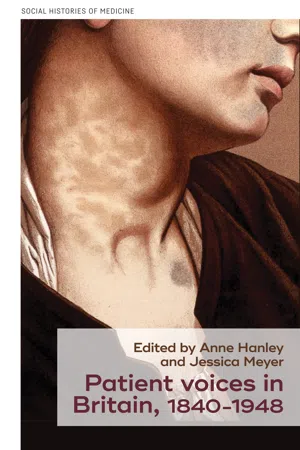3
Lunatics’ rights activism in Britain and the German Empire, 1870–1920: a European perspective*
Burkhart Brückner
Participation and empowerment are core issues in contemporary mental health policy. Involving (ex-)users as ‘experts by experience’ has become an internationally accepted guiding principle for civil society health promotion, especially in the wake of the 2006 UN Convention on the Rights of Persons with Disabilities. However, this ‘mainstream user involvement’ also meets with scepticism from user self-advocacy initiatives and organisations.1 This can, for example, be seen in the words of Diana Rose, a ‘user/survivor academic’ at London's King's College, who, while criticising the austerity policy in the British healthcare system, emphasises the significance of local, ‘hidden’ and often radical grassroots groups:
This activism is barely visible socially because ‘the mad organising’ is an oxymoron and there are material conditions for not being persistently open. It is hidden, it is suspicious and it is angry but with a righteous anger.2
This quote addresses key topics of today's ‘consumer/survivor/ex-patient’ (c/s/x) movement: structural disadvantaging, emotionalised protest, mobilisation capacity and media (in-)visibility; in short, the chances and contradictions of (ex-)users’ political ‘struggles for recognition’.3
The history of this movement, however, has not yet been fully explored. Historical discussions are usually limited to the second half of the twentieth century; moreover, comparative studies are missing so far. The main objective of this chapter, therefore, is to investigate the lunatics’ rights activism between 1870 and 1920, both in bilateral comparison and in the European context. A historical comparison of this kind allows us not only to reconstruct the scale of this early activism as a precursor of today's c/s/x movements but also to more closely examine the strategies and patterns of self-advocacy, mobilisation and political lobbying. Actually, in Europe around 1900, the criticism of psychiatry and the associated activism were not ‘hidden’ but rather on everybody's lips.
The first (ex-)patient organisations emerged in the mid-nineteenth century in England in reaction to a number of asylum scandals, such as the arbitrary internment of the writer Rosina Bulwer Lytton (1802–82) in a private madhouse at the instigation of her husband Edward Bulwer Lytton (1803–78). This event caused a considerable stir in 1858, and the scheme against Lady Lytton was condemned by several commentators, among them John Stuart Mill (1806–73), Karl Marx (1818–83) and the lunatics’ rights activist John Thomas Perceval (1803–76).4 This and other scandals during the years 1858/59 intensified the Victorian public's scepticism towards the lunacy law reform of 1845.5 The Alleged Lunatics’ Friend Society (ALFS), an early self-advocacy organisation of former patients co-founded by John Perceval in 1845, achieved a parliamentary inquiry in 1859 – but their most important demand, a timely judicial review of committals, was only met in 1890 with the passing of the Lunacy Act of that year.6 This ‘triumph of legalism’, as this liberal law has been labelled, thus was the result of decade-long debates over the ‘lunacy question’ in England.7 Such debates were not restricted to Britain: they occurred in the whole of Western Europe, and the people involved included physicians, jurists and politicians, as well as former patients. This critical discourse by ex-inmates and their allies has repeatedly been investigated for France, Britain, Germany and Switzerland, and traces can be found across the continent.
Against this backdrop, this chapter will point out the prerequisites for the emergence of lunatics’ rights activism as well as its chances for political success by discussing two key figures, the British spiritualist Louisa Lowe (1820–1901) and the German merchant Adolf Glöklen (1861–c.1935), former patients who initiated influential self-advocacy organisations. Drawing on their examples, I explore the intersections between expert and lay discourse, medical science and the judiciary, social structure and individual fate. How did Lowe and Glöklen become such prominent critics of psychiatry? What were their experiences and motives, their preferred alliances and political strategies? And can the campaigns that they initiated be considered social movements in the proper sense?
To answer these questions, I interpret the history of psychiatry around 1900 from the perspective of a social history of (user) experience.8 Using the activists’ self-narratives as a starting point, I draw on concepts developed in disability history and the political sociology of social movements and use the term ‘self-advocacy’ as a key concept.9 Roy Porter has been discussing self-narratives of (ex-)inmates since the 1980s, referring to them as ‘communications in their own right’ and as expressions of a specific subculture.10 In 2010, Aude Fauvel argued along the same lines by questioning Michel Foucault's propositions regarding the ‘absence of madness’ in modernity:
Parallel to a history of exclusion, there is thus another history: that of the ways through which the insane have tried to re-inhabit the public scene – a history of the ‘return of the repressed’, as it were, which should seek to explore the impact of the patient's expressions both on a national and a transnational perspective.11
This historical trajectory begins in eighteenth-century Britain with early polemics on the ‘trade in lunacy’.12 Like the women's movement, the first wave of Europe-wide criticism of psychiatry emerging in the late nineteenth century can be seen as a predecessor to the second wave that occurred between 1960 and 1990. This, in turn, resulted in user involvement policies and the consumer/survivor/ex-patient movement in the twenty-first century.
Lunacy panic all over Europe
What were the themes and trends, and who were the people shaping lunatics’ rights activism in Western Europe between 1870 and 1920? In ...
